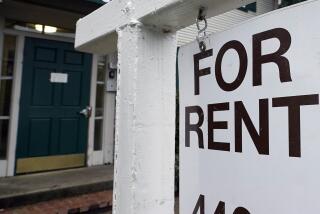YOUR TAXES : PART SIX: PROFILE : Choices for the young, single engineer : As income rises, he should buy a home, reduce debt, add to 401(k)
- Share via
Mark G. Speed was the first member of his family to go to college, fulfilling a dream of his father, John, an auto worker at a General Motors plant near Cincinnati.
Graduating in 1981 from the University of Cincinnati with a bachelor’s degree in physics, Speed, who’s 27 now, left the farm where he grew up in Brown County, Ohio, for Los Angeles and a job as an engineer at Northrop Corp. In late 1985, he joined Technology Service Corp., a Westinghouse subsidiary in Santa Monica, where he works as a radar engineer.
The opportunities that Speed’s college degree have given him have also pushed his income to nearly twice what it was when he left college six years ago. When he graduated at 21, he made $23,500. Last year, he earned about $44,000.
But Speed’s increased income has also brought a host of confusing financial choices that are faced by many young single professionals. Although he wants to know more about investments and about methods to cut his taxes, he spends little time on his financial planning, which he considers characteristic of young engineers who are deeply involved in their work.
Indeed, Speed hasn’t taken advantage in the past of common deductions he can afford, such as establishing an individual retirement account. He also never used income averaging, a method in which those with fluctuating or rapidly increasing incomes could sometimes cut their taxes. Income averaging, already severely limited, is being eliminated altogether under the new tax law.
Speed estimates that in his profession and at his salary level, he can expect his income to increase about 6% annually. That would make his salary nearly $47,000 in 1987, more than $49,000 in 1988 and about $52,000 in 1989.
Speed is single but hopes to be married by age 30, and he wants to buy a home within a few years. He is looking for safe investments that pay about 10% and considers some too risky, particularly common stocks.
Unlike many single people out of school, Speed has little debt. He paid off his student loans within three years of graduation and has no credit card debt. Speed’s only major liability is a loan on his 1986 Mazda pickup truck, for which he pays $208.71 monthly. As of last month, the $10,000 loan had been paid down to $7,930.
His largest expense is the $425 a month in rent for an El Segundo apartment that he shares with one roommate. He gives 10% of his income to his church, Hope Chapel in Hermosa Beach, and will contribute $360 a month in 1987 to a special building fund for the church, which he doesn’t deduct for personal reasons.
Speed’s largest asset is a government securities trust investment program bought last year through the Dean Witter Reynolds brokerage. Speed invested $8,000, which has appreciated by about $700. Dividends are reinvested, and he must keep his money in the program for six years to avoid sales charges.
He also has $6,650 in a credit union account paying 6.5% that he established when he worked for Northrop, and he has a 401(k) retirement plan through his current employer with about $2,000. He contributes 2% of his pretax income to the plan. His employer contributes $1 into the plan for every $2 that Speed contributes.
Speed also carries a large balance--sometimes as much as $1,000 to $2,000--in his checking account, which earns no interest.
Under the new tax code, deductions for consumer interest payments are being phased out, and deductions for sales taxes are being eliminated altogether. Often they are two of the largest deductions taken by young single people who rent.
Speed is mostly unaffected by those changes, since the only major interest payment he has is the loan on his truck, and he has few sales tax deductions.
Speed doesn’t have an individual retirement account, another common tax break, which could have reduced his taxable income by $2,000. Speed won’t be able to take advantage of the IRA deduction under the new tax bill because he makes more than $35,000 a year and is enrolled in a qualified company pension plan.
Speed’s charitable deductions, such as his 10% contribution to his church, are unaffected by the new law.
On balance, Speed doesn’t appear to be a big winner or loser from tax reform. He’ll pay more taxes in the future, but mostly because his income is rising. According to projections by Arthur Young & Co., he’ll pay $8,338 in 1986, $8,745 in 1987, $8,690 in 1988 and $9,403 in 1989.
In the future, what can Speed do to cut his taxes? He should increase his contribution to his company-sponsored retirement plan, allowing him to defer more income and receive more matching contributions from his employer. (His company will allow him to contribute up to 10% of his salary.) He also should contribute to an IRA before April 15 while he still can take advantage of that tax break for 1986.
Deferring income in 1987 is important for Speed because tax rates will be lower in 1988. He also should continue his practice of keeping his consumer debt down. The new tax laws phase out deductions of interest on consumer loans by 1991.
Most important, he should work toward buying a home, probably the biggest tax break available to him.
Arthur Young also estimated Speed’s future tax bills assuming that he bought a home with a $125,000 mortgage at a 10% interest rate. The projection shows that he would cut his taxes by 48% to $4,511 in 1987, by 41% to $5,152 in 1988 and by 37% to $5,888 in 1989. In each of those years, he would be in the 28% bracket.
Another suggestion from the Arthur Young analysis was buying rental property as a tax shelter. Losses of up to $25,000 on the rental property may be deducted if it is actively managed.
But Ellis Balsam, a tax partner with accountants Peat, Marwick, Mitchell & Co. in Century City, suggested that a young single person avoid rental property before buying a home to live in. Buying rental property in Southern California, he said, could burden a young single person with negative cash flow in which the mortgage payment exceeds the rent collected.
Speed also needs to learn more about financial planning and may want to seek advice from financial and tax counselors.
Joseph D. Vinso, an associate professor of business at USC, said it’s common for young professionals to ignore their finances, particularly those involved in technical professions that require large amounts of time and concentration.
“You know what they say about engineers?” said Vinso, himself a former engineer. “They’re the only ones smart enough to build the Brooklyn Bridge and the only ones dumb enough to buy it. There’s a lot of truth to that.”
Tax analysis by Arthur Young
The editors of Your Taxes wish to thank Robert E. Billings and Jacqueline Patterson of the Beverly Hills office of Arthur Young & Co. for providing tax analysis and forecasting for the three profiles in this section.
More to Read
Inside the business of entertainment
The Wide Shot brings you news, analysis and insights on everything from streaming wars to production — and what it all means for the future.
You may occasionally receive promotional content from the Los Angeles Times.









